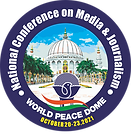SESSION UPDATES
Plenary Session 8
Relevance of Radio as a Medium of Mass Communication for Public welfare. | Plenary Session 8
Radio is an attractive medium among the various mass communication media because of its special characteristics. It continues to be as relevant and potent as it was in the early years despite the emergence of more glamorous media. It is a truism that in the first phase of broadcasting spanning three decades from the early twenties, radio reigned alone or was the dominant player. However, over a period of time, the media scene has changed drastically. Television with its inherent strength of audio-visual component has captured the imagination of the people. The advent of satellite television, the Internet and the convergence of technology have added further dimensions in media utilization patterns. However, despite the presence of a plethora of media, there is room and scope for each medium. Experience has revealed that ‘new technologies add things on but they don’t replace’. One medium is not displaced by another – each medium reinvents itself in the context of changes in the communication environment. In the changed media scenario, radio is reorienting itself with more innovative programmes and formats.
Thursday, 24 Sept 2020 (11.00 am to 12.30 pm)
The entire session was conducted in a question and answer format. These are just a reflection of their views as gleaned by the answers they provided to the asked questions.
Humayun Qaisar - The learned speaker stated that the importance of radio is not to be understated and while the medium remains popular it has undergone various changes such as with the advent of technology now one can carry a radio in one’s pocket and listen to someone. Radio remains very popular with vehicles and even the new ‘podcasts’ can be construed as an evolution of the radio itself. He further stated that for rural and remote areas, the radio is not a luxury but rather a necessity.
R J Tarun - The learned speaker stated that as important as the radio is, he has witnessed only a minor change in the way people are addressed. Earlier it used to be formal, but now it is increasingly informal. Yet it is a fun medium where originality of thought can be maintained and which provides lots of entertainment to the listeners. He also beliefs that the radio introduces a personal touch which the TV can never manage.
Shuja Ul Haq - the learned speaker states that the power of radio cannot be replaced by the net or by the television. It is because of the gravity that is associated with this form of communication and due to its history of being the first mass communication device that facilitated the rapid transfer of ideas from one individual to another.
Ms Shweta - The learned speaker stated that radio indeed acts like a buffer between the government and the people. She stated her own personal experience of being in Jammu while the emergency was declared and she used to be on air for upto 12 hours a day despite the challenges to her safety. She felt responsible to her listeners knowing this was the only relief they were getting.


